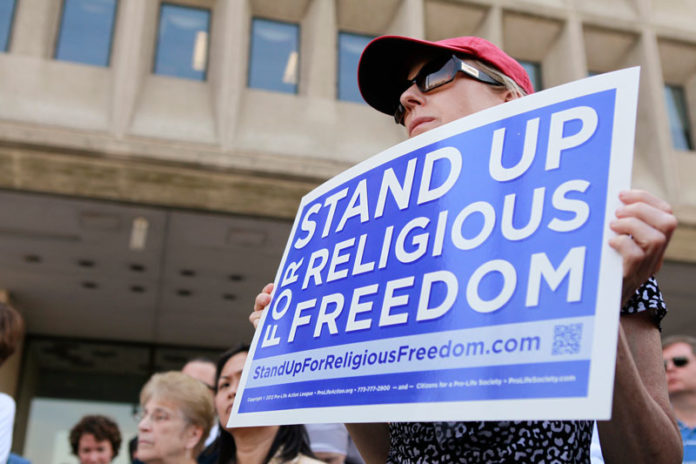Hanging on the rest room door of a Kroger grocery store in Athens, Georgia is a sign explaining why the facilities are unisex: “We have a UNISEX bathroom because sometimes gender specific toilets put others into uncomfortable situations.” The note goes on to list a few examples of such situations — dads with small daughters, moms with young sons, and adults with aging parents who may be mentally or physically disabled. It is an example of something that in a place far, far away and at a time long, long ago, would have required no explanation. Not so in 21st Century America.
Even in my home state of Georgia, one of the politically reddest of Red States, a unisex rest room in a grocery store is seen as a line in the sand for a major political battle.
Just days ago, for example, the Georgia legislature passed a bill that, according to which side one listens, either protects the sanctity of Christianity from the forces of evil, or targets homosexual and transgender persons for legalized discrimination. Lost in the ruckus is any real sense of prioritization.
This is Georgia’s version of the recent wave of “Religious Freedom Restoration” bills passed in other states including Indiana and North Carolina. And, like those other laws, it is an almost entirely unnecessary response to rare and isolated incidents — the proverbial solution in search of ?a problem.
Aside from the veiled discrimination the law might allow, the language used in the bill’s provisions (e.g., “sincerely held religious beliefs”) is so loose as to be akin to a neon sign: “Sue For Unconstitutional Vagueness.” If Georgia’s Republican Governor Nathan Deal had failed to veto the bill (which he announced on Monday he would do), the ink would not have dried on his signature before the law would have been challenged and likely invalidated in the courts; thereby placing its proponents in a worse situation than before the political battle was joined.
Meanwhile, those on the political Left remain consumed with the symbolism of the legislation even more than its actual efficacy. The usual suspects, including Disney Corp. and Salesforce CEO and billionaire Marc Benioff, had weighed in against the legislation; threatening to divest their business interests from the Peach State should Deal have failed to veto it. Given Benioff’s previous zeal in leading the push to force Indiana to amend its religious freedom law, such threats are not to be taken lightly, even though they ultimately would have harmed the very people the threats are supposed to help — employees and customers.
At the national political level, Donald Trump’s rhetorical efforts to keep attention focused on him and the insults he regularly hurls at his opponents notwithstanding, a primary focus of this year’s election is on jobs and the economy — stagnant wages, government over-spending and regulation, taxes, immigration, and related issues. Yet, at the state level, what voters see more often than not, are arguments and time wasted on what are in the most charitable characterization, niche problems.
Moreover, the manner in which bills such as those dealing with restoring “religious freedom” purport to address the “problem” is overshadowed by the intentionally provocative nature of the bills. And, for real people at home or who are trying to run small businesses profitably, true religious freedom is made no less safe; and the other, very real problems faced — regulatory overreach and heavy taxation — are no closer to being solved.
It is axiomatic that religious liberty is a fundamental principle protected by our Bill of Rights, but “Religious Freedom” bills such as the one presented to Georgia’s Republican Governor, seek only to protect a very narrow sliver of those freedoms; and often in ways that do more harm than good. Conservatives should be pursuing far better ways to uphold religious liberty in America — such as electing principled constitutionalists to office — that are more productive and deserving of our political attentions, and which will engender far fewer adverse consequences to more important policy issues.
The ultimate goal of conservatives should be to change the hearts and minds of our opponents on religious freedom but, where necessary, to carefully target and repeal existing laws (including those enacted by Republicans) that limit individual freedom. Such a strategy is a far more likely future guarantee of securing religious liberty than any single and poorly-drafted bill that can be reversed with a subsequent vote or court decision.
Unfortunately, all we seem to be doing with symbolic legislation like that purporting to “restore” religious freedom, is further entrench each side in a highly contentious, but ultimately futile, stalemate in which the true meaning of Liberty slips further from the public consciousness; and with it, any real chance of constructively repairing the damage to individual freedom that decades of government meddling has wrought
Hanging on the rest room door of a Kroger grocery store in Athens, Georgia is a sign explaining why the facilities are unisex: “We have a UNISEX bathroom because sometimes gender specific toilets put others into uncomfortable situations.” The note goes on to list a few examples of such situations — dads with small daughters, moms with young sons, and adults with aging parents who may be mentally or physically disabled. It is an example of something that in a place far, far away and at a time long, long ago, would have required no explanation. Not so in 21st Century America.
Even in my home state of Georgia, one of the politically reddest of Red States, a unisex rest room in a grocery store is seen as a line in the sand for a major political battle.
Just days ago, for example, the Georgia legislature passed a bill that, according to which side one listens, either protects the sanctity of Christianity from the forces of evil, or targets homosexual and transgender persons for legalized discrimination. Lost in the ruckus is any real sense of prioritization.
This is Georgia’s version of the recent wave of “Religious Freedom Restoration” bills passed in other states including Indiana and North Carolina. And, like those other laws, it is an almost entirely unnecessary response to rare and isolated incidents — the proverbial solution in search of ?a problem.
Aside from the veiled discrimination the law might allow, the language used in the bill’s provisions (e.g., “sincerely held religious beliefs”) is so loose as to be akin to a neon sign: “Sue For Unconstitutional Vagueness.” If Georgia’s Republican Governor Nathan Deal had failed to veto the bill (which he announced on Monday he would do), the ink would not have dried on his signature before the law would have been challenged and likely invalidated in the courts; thereby placing its proponents in a worse situation than before the political battle was joined.
Meanwhile, those on the political Left remain consumed with the symbolism of the legislation even more than its actual efficacy. The usual suspects, including Disney Corp. and Salesforce CEO and billionaire Marc Benioff, had weighed in against the legislation; threatening to divest their business interests from the Peach State should Deal have failed to veto it. Given Benioff’s previous zeal in leading the push to force Indiana to amend its religious freedom law, such threats are not to be taken lightly, even though they ultimately would have harmed the very people the threats are supposed to help — employees and customers.
At the national political level, Donald Trump’s rhetorical efforts to keep attention focused on him and the insults he regularly hurls at his opponents notwithstanding, a primary focus of this year’s election is on jobs and the economy — stagnant wages, government over-spending and regulation, taxes, immigration, and related issues. Yet, at the state level, what voters see more often than not, are arguments and time wasted on what are in the most charitable characterization, niche problems.
Moreover, the manner in which bills such as those dealing with restoring “religious freedom” purport to address the “problem” is overshadowed by the intentionally provocative nature of the bills. And, for real people at home or who are trying to run small businesses profitably, true religious freedom is made no less safe; and the other, very real problems faced — regulatory overreach and heavy taxation — are no closer to being solved.
It is axiomatic that religious liberty is a fundamental principle protected by our Bill of Rights, but “Religious Freedom” bills such as the one presented to Georgia’s Republican Governor, seek only to protect a very narrow sliver of those freedoms; and often in ways that do more harm than good. Conservatives should be pursuing far better ways to uphold religious liberty in America — such as electing principled constitutionalists to office — that are more productive and deserving of our political attentions, and which will engender far fewer adverse consequences to more important policy issues.
The ultimate goal of conservatives should be to change the hearts and minds of our opponents on religious freedom but, where necessary, to carefully target and repeal existing laws (including those enacted by Republicans) that limit individual freedom. Such a strategy is a far more likely future guarantee of securing religious liberty than any single and poorly-drafted bill that can be reversed with a subsequent vote or court decision.
Unfortunately, all we seem to be doing with symbolic legislation like that purporting to “restore” religious freedom, is further entrench each side in a highly contentious, but ultimately futile, stalemate in which the true meaning of Liberty slips further from the public consciousness; and with it, any real chance of constructively repairing the damage to individual freedom that decades of government meddling has wrought.































